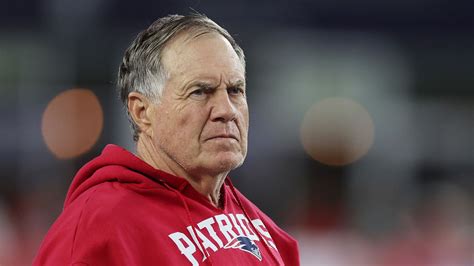
Bill Belichick’s surprise appearance and unconventional coaching role at the University of North Carolina’s (UNC) spring football game has been labeled a “disaster” by some, raising questions about the effectiveness and intent behind the partnership between the legendary NFL coach and Tar Heels’ offensive coordinator Chip Lindsey in mentoring quarterback transfer Walker Howard. The experiment, designed to provide Howard with invaluable insights and elevate his performance, seemingly backfired, leaving many observers perplexed and prompting scrutiny of the methods employed.
The highly anticipated collaboration between Belichick, known for his defensive prowess and strategic acumen, and Howard, a promising quarterback looking to make his mark in Chapel Hill, failed to translate into on-field success during the spring game. The performance, as highlighted in a Yahoo Sports video analysis, revealed a disconnect between the coaching input and the quarterback’s execution, leading to concerns about the overall strategy and its impact on Howard’s development.
“It looked like a disaster,” stated the Yahoo Sports analyst in the video segment, emphasizing the stark contrast between expectations and reality. This assessment underscores the central question: What went wrong with Belichick’s involvement, and why did it fail to produce the desired results for UNC’s quarterback situation?
The arrival of Bill Belichick at UNC’s spring practice generated considerable buzz, fueled by the prospect of the former New England Patriots head coach imparting his vast football knowledge to the Tar Heels’ quarterbacks. Belichick, a figure synonymous with defensive innovation and meticulous game planning, was expected to provide a unique perspective and elevate the quarterback room’s understanding of the game. The arrangement, orchestrated by offensive coordinator Chip Lindsey, aimed to accelerate the development of Walker Howard, a transfer quarterback from LSU, who was poised to compete for the starting role following the departure of Drake Maye.
However, the actual implementation of Belichick’s coaching during the spring game did not yield the anticipated benefits. Observers noted a lack of cohesion and synergy between Howard and the coaching staff, resulting in miscommunication, poor decision-making, and ultimately, subpar performance on the field. The Yahoo Sports analysis pointed to specific instances where Howard appeared unsure of his reads, hesitated in the pocket, and struggled to execute the offensive game plan effectively.
The concerns surrounding Belichick’s involvement extend beyond mere on-field performance. Questions have been raised about the compatibility of his coaching style with the existing offensive scheme and the learning curve required for Howard to adapt to Belichick’s complex strategies. Some analysts have suggested that Belichick’s expertise, primarily rooted in defensive strategies and overall game management, may not have seamlessly translated into the intricacies of quarterback development and offensive play-calling. The abrupt shift in coaching dynamics and the introduction of new concepts could have overwhelmed Howard, hindering his ability to process information and react decisively during the game.
The “disaster” label attached to the Belichick-Howard collaboration also reflects the high expectations surrounding both individuals. Belichick’s reputation as one of the greatest coaches in NFL history created a sense of anticipation that his presence would immediately elevate UNC’s quarterback play. Similarly, Howard’s status as a highly touted transfer quarterback added to the pressure to perform at a high level. The combination of these factors amplified the disappointment when the partnership failed to deliver the expected results.
Furthermore, the situation has sparked debate about the broader implications of bringing in external consultants or guest coaches to work with college football teams. While such arrangements can provide valuable insights and fresh perspectives, they also carry the risk of disrupting team chemistry, confusing players with conflicting coaching styles, and ultimately hindering overall performance. The UNC experiment serves as a cautionary tale, highlighting the importance of careful planning, clear communication, and a well-defined integration strategy when incorporating external expertise into a team’s coaching structure.
The long-term ramifications of this spring game performance on Walker Howard’s development and UNC’s quarterback situation remain to be seen. It is possible that the experience, despite its initial setbacks, could serve as a valuable learning opportunity for Howard. By identifying areas for improvement and refining his understanding of the game, he may be able to bounce back and emerge as a more polished and confident quarterback. However, the pressure to perform will undoubtedly intensify as the season approaches, and Howard will need to demonstrate significant progress in order to secure the starting role and justify the faith placed in him by the coaching staff.
The incident also casts a shadow on Chip Lindsey’s role as offensive coordinator. The decision to bring in Belichick, while seemingly a bold move, ultimately backfired and raised questions about Lindsey’s judgment and ability to manage the quarterback development process effectively. Lindsey will need to address the concerns surrounding Howard’s performance and demonstrate a clear plan for moving forward in order to maintain the confidence of the coaching staff and the UNC fan base.
In conclusion, the Belichick-Howard collaboration at UNC’s spring game represents a significant misstep, highlighting the complexities of integrating external expertise into a college football program. While the intentions behind the partnership were undoubtedly noble, the execution fell short of expectations, leading to a “disaster” that has sparked widespread debate and scrutiny. The long-term impact on Walker Howard’s development and UNC’s quarterback situation remains uncertain, but the incident serves as a valuable lesson about the importance of careful planning, clear communication, and a well-defined integration strategy when incorporating external expertise into a team’s coaching structure. The situation emphasizes that even the most brilliant minds in football cannot guarantee success without a cohesive plan and a player fully prepared to execute it. The Tar Heels must now regroup and determine the best path forward to ensure their quarterback situation is solidified before the season begins. The pressure is on for both Howard and Lindsey to prove that this spring game was an anomaly and not a sign of deeper issues.
Expanded Analysis:
Delving deeper into the situation reveals several contributing factors to the perceived failure. Beyond the immediate on-field performance, the underlying philosophies and expectations surrounding Belichick’s role warrant closer examination. Belichick, known for his intense, demanding style and emphasis on discipline and precision, may have inadvertently created an environment that was too rigid or overwhelming for Howard, who is still relatively early in his college career. The pressure to immediately implement Belichick’s strategies, coupled with the public attention surrounding his presence, could have amplified Howard’s anxiety and hindered his ability to play freely and instinctively.
Furthermore, the lack of a clearly defined scope for Belichick’s involvement may have contributed to the confusion and disconnect. It remains unclear whether Belichick was intended to serve as a long-term mentor, a short-term consultant, or simply a guest observer offering occasional advice. Without a well-defined role, it would have been difficult for Howard to fully integrate Belichick’s input into his game. The absence of a structured framework for communication and feedback could have also led to misunderstandings and misinterpretations, further exacerbating the challenges.
The timing of Belichick’s arrival also raises questions about its potential impact on Howard’s development. Introducing a new coaching influence during the crucial spring practice period, when players are typically focused on solidifying their fundamentals and building team chemistry, could have been disruptive and counterproductive. Howard was already adjusting to a new team, a new offensive scheme, and a new set of teammates. Adding Belichick’s perspective into the mix may have overloaded him with information and hindered his ability to focus on the core principles of the offense.
In addition to the individual factors involving Belichick and Howard, the overall state of the UNC offense also deserves consideration. The Tar Heels are undergoing a transition period following the departure of Drake Maye, a star quarterback who had been the focal point of the offense for several years. Replacing Maye’s production and leadership will be a significant challenge, and the team may need time to develop a new offensive identity. Howard’s struggles during the spring game could be symptomatic of broader issues within the offense, rather than solely attributable to Belichick’s involvement.
Looking ahead, UNC’s coaching staff will need to carefully assess the lessons learned from the Belichick experiment and make adjustments to their approach. It is crucial to provide Howard with a supportive and structured environment that allows him to develop at his own pace. The coaching staff should focus on simplifying the offensive scheme, emphasizing fundamental techniques, and fostering a strong sense of team chemistry. They should also consider scaling back the external influences and allowing Howard to focus on building a strong relationship with the offensive coordinator and the rest of the coaching staff.
Ultimately, the success of UNC’s quarterback situation will depend on Howard’s ability to learn from his mistakes, improve his performance, and emerge as a confident and capable leader. The Belichick incident serves as a reminder that even the most talented players need time, patience, and a supportive environment to reach their full potential. The Tar Heels must now prioritize creating the conditions necessary for Howard to thrive, ensuring that he has the resources and support he needs to succeed. This includes fostering clear communication, establishing realistic expectations, and providing consistent feedback.
Moreover, the situation highlights the importance of adaptability in coaching. While Belichick’s methods have proven successful in the NFL, they may not be directly transferable to the college level. College players are typically younger, less experienced, and more susceptible to outside influences. Coaches must be willing to adjust their approach to meet the unique needs of their players, recognizing that a one-size-fits-all strategy is unlikely to yield optimal results. The UNC coaching staff should reflect on the lessons learned from the Belichick experiment and adapt their strategies to better suit the developmental needs of their players.
Further Considerations:
The incident also raises questions about the role of media hype and public perception in shaping the narrative surrounding college football teams. The initial excitement surrounding Belichick’s arrival created unrealistic expectations and amplified the disappointment when the partnership failed to deliver. The media’s tendency to focus on sensational storylines and dramatic narratives can often distort the reality of a situation, making it difficult to assess the true factors at play. Coaches and players must be able to filter out the noise and focus on the task at hand, avoiding the trap of succumbing to external pressure or being swayed by public opinion.
The UNC situation underscores the challenges of managing expectations in the age of social media and instant communication. The constant barrage of information and opinions can create a sense of urgency and impatience, making it difficult to allow players and teams to develop naturally. Coaches must be able to communicate effectively with their players, their fans, and the media, setting realistic expectations and managing the narrative in a way that supports the team’s long-term goals.
In conclusion, the Belichick-Howard collaboration at UNC’s spring game represents a complex and multifaceted situation with implications that extend beyond mere on-field performance. The incident highlights the challenges of integrating external expertise, managing expectations, adapting coaching styles, and navigating the pressures of media scrutiny. The Tar Heels must now learn from their mistakes and adjust their approach to ensure that their quarterback situation is solidified before the season begins. The success of Walker Howard and the overall trajectory of the UNC offense will depend on the ability of the coaching staff to create a supportive, structured, and adaptable environment that allows players to develop at their own pace and reach their full potential. This requires a commitment to clear communication, realistic expectations, and a willingness to learn from both successes and failures. The road ahead may be challenging, but with a renewed focus on these core principles, the Tar Heels can overcome the setbacks of the spring game and build a foundation for future success.
The scrutiny extends beyond just the performance; it touches upon the philosophical alignment, the impact of high-profile figures, and the practical application of theoretical knowledge to on-field execution. This wasn’t just a bad day; it was a confluence of factors that turned a potentially beneficial arrangement into a noticeable setback. The reverberations of this event will likely be felt throughout the UNC program as they reassess their strategies for player development and external collaborations.
Frequently Asked Questions (FAQ):
1. What specifically made Bill Belichick’s involvement at UNC’s spring game a “disaster”?
The “disaster” label stems from the perceived lack of positive impact on quarterback Walker Howard’s performance during the spring game. Observers noted miscommunication, hesitant decision-making, and an overall struggle to execute the offensive game plan, despite Belichick’s presence and input. The expectation was that Belichick’s experience would immediately elevate Howard’s play, but the opposite seemed to occur.
2. What was Belichick’s role supposed to be, and why didn’t it work out as planned?
Belichick’s role was intended to provide mentorship and strategic insights to quarterback Walker Howard, leveraging his extensive football knowledge. However, the exact nature of his role (long-term mentor vs. short-term consultant) was not clearly defined, which may have contributed to the disconnect. Furthermore, his demanding coaching style and emphasis on complex strategies might have overwhelmed Howard, hindering his ability to process information and react decisively. The compatibility of Belichick’s primarily defensive expertise with the intricacies of quarterback development may also have been a factor.
3. How might this experience affect Walker Howard’s future development and performance at UNC?
The impact on Howard’s future development is uncertain. It could serve as a valuable learning experience, prompting him to identify areas for improvement and refine his understanding of the game. However, the pressure to perform will likely intensify, and he will need to demonstrate significant progress to secure the starting role. The experience could also negatively impact his confidence if not managed properly by the coaching staff.
4. What is Chip Lindsey’s role in this situation, and how might this reflect on his abilities as Offensive Coordinator?
Chip Lindsey, as the Offensive Coordinator, orchestrated Belichick’s involvement, so the outcome reflects on his judgment and ability to manage quarterback development effectively. The failed experiment raises questions about his strategic planning and ability to integrate external expertise into the team’s coaching structure. He will need to address the concerns surrounding Howard’s performance and demonstrate a clear plan for moving forward to maintain the confidence of the coaching staff and fans.
5. What are the broader implications of this incident for college football programs considering bringing in external consultants or guest coaches?
The UNC experiment serves as a cautionary tale, highlighting the risks of disrupting team chemistry, confusing players with conflicting coaching styles, and hindering overall performance. It underscores the importance of careful planning, clear communication, and a well-defined integration strategy when incorporating external expertise. College programs must carefully consider the potential downsides before bringing in external consultants and ensure that their involvement aligns with the team’s overall goals and developmental needs. A strong pre-existing relationship between the guest coach, the existing coaching staff, and the player is probably more critical than the fame or reputation of the guest.









